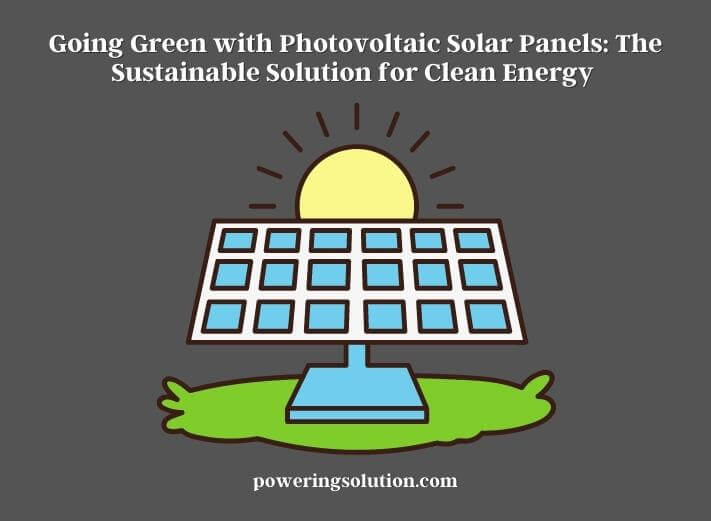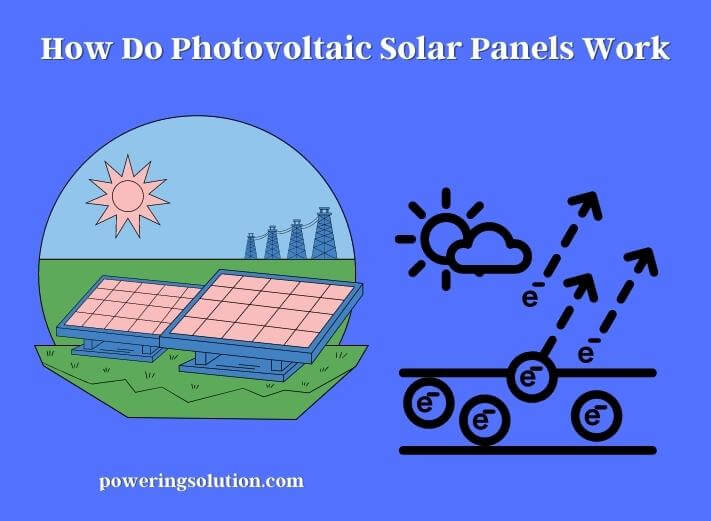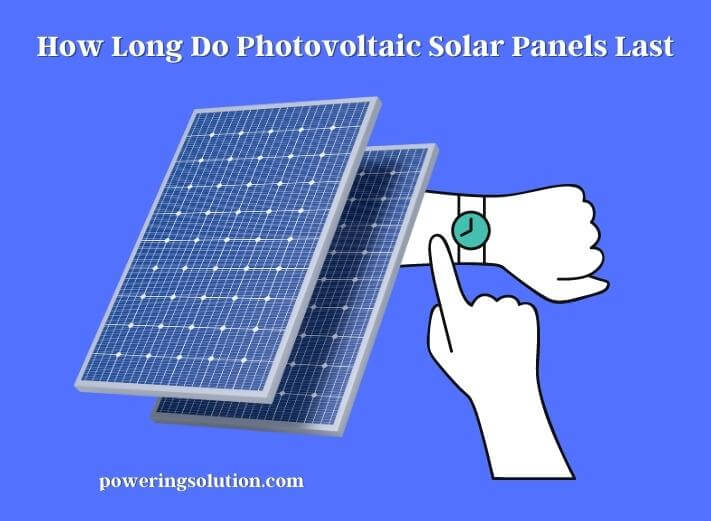As the world continues to grapple with the challenges of climate change and environmental degradation, there is a growing need for sustainable solutions that can help reduce our reliance on fossil fuels and other non-renewable energy sources. One such solution is the use of photovoltaic solar panels, which harness the power of the sun to produce clean and renewable energy.

Solar energy is one of the most abundant and readily available sources of renewable energy on our planet. Unlike fossil fuels, which are finite and non-renewable, the sun’s energy is available to us every day, free of charge. Solar panels capture this energy and convert it into usable electricity that can power homes, businesses, and even entire communities.
Going green with photovoltaic solar panels is not only environmentally responsible, but it can also lead to significant cost savings over time. By generating your own electricity, you can reduce or even eliminate your reliance on the grid, which can result in lower energy bills and greater energy independence.
From the installation process to maintenance and energy production0., we will cover everything you need to know to make an informed decision about whether solar energy is the right choice for you.
How Do Photovoltaic Solar Panels Work?
To understand how photovoltaic solar panels work, it’s important to first understand the science behind them. Solar panels are made up of photovoltaic cells, which are made from semiconductor materials such as silicon. When sunlight hits these cells, it causes electrons to become excited and flow through the material, creating a flow of electricity.
Each individual photovoltaic cell produces only a small amount of electricity, so multiple cells are combined into modules, which are then connected to form a solar panel. These panels can be connected together to create an array, which can generate enough electricity to power a home or business.

The Installation Process for Solar Panels
The installation process for solar panels typically involves several key steps. First, a professional installer will evaluate your property to determine the best location for the panels based on factors such as the amount of sunlight your property receives and the orientation of your roof.
Once the location has been determined, the installer will mount the panels on your roof or on a separate structure such as a ground-mounted rack. The panels are then wired together and connected to an inverter, which converts the DC electricity produced by the panels into AC electricity that can be used to power your home or business.
The Amount of Energy Produced by a Solar PV System
The amount of energy produced by a solar PV system depends on several factors, including the size of the system, the amount of sunlight the panels receive, and the efficiency of the panels themselves. However, a typical solar panel system can produce enough electricity to offset a significant portion of a home or business’s energy needs.
In addition, many solar PV systems are equipped with net metering, which allows you to sell any excess electricity generated by your system back to the grid. This can result in further cost savings and can even allow you to earn money on your investment in solar energy.
Maintenance Process for Solar Panels
Like any system, solar panels require regular maintenance to ensure optimal performance and longevity. This typically involves cleaning the panels to remove any debris or dirt that can reduce energy production, as well as having them inspected by a professional to check for any issues that may affect performance.
By properly maintaining your solar PV system, you can ensure that it continues to generate clean and renewable energy for years to come.
The Benefits of Photovoltaic Solar Panels
The benefits of going green with photovoltaic solar panels are numerous. Some of the key benefits include:
- Environmental Sustainability: Solar energy is a clean and renewable source of energy that produces no emissions or pollution.
- Cost Savings: Solar energy can help reduce or even eliminate your energy bills, resulting in significant cost savings over time.
- Energy Independence: By generating your own electricity, you can reduce your reliance on the grid and become more energy independent.
- Increased Property Value: Solar PV systems can increase the value of your property and make it more attractive to potential buyers.
Photovoltaic solar panels offer a sustainable and cost-effective solution for clean energy.
Benefits of Going Green with Photovoltaic Solar Panels
Going green with photovoltaic solar panels offers many benefits, both for the environment and for individuals and businesses.
Environmentally Friendly
Solar energy is a clean and renewable source of energy that produces zero emissions. By using solar energy, individuals and businesses can reduce their carbon footprint and help combat climate change. In addition, solar energy does not require any water to produce electricity, unlike fossil fuels, which can use large amounts of water for cooling.
Cost-effective
Although the initial cost of installing a solar PV system can be high, the long-term savings can be significant. Solar energy can reduce or eliminate electricity bills, depending on the size of the system and the energy needs of the home or business. In addition, many governments offer incentives and rebates for installing solar PV systems, making it even more cost-effective.
Increased Property Value
Installing solar panels can increase the value of a property, as it is considered a desirable feature for environmentally conscious buyers. A study by the Lawrence Berkeley National Laboratory found that homes with solar PV systems sold for an average of $15,000 more than homes without solar.
Can Solar PV Systems Work During Cloudy or Rainy Weather?
Yes, solar PV systems can still generate electricity even during cloudy or rainy weather, although their output will be lower compared to sunny weather. This is because solar panels are designed to capture sunlight, not necessarily heat, and can still generate electricity even in low light conditions.
It’s important to note that the amount of electricity generated by a solar PV system during cloudy or rainy weather will depend on several factors, including the thickness of cloud cover, the time of day, and the orientation of the panels.
Some solar PV systems are designed with battery storage, which can store excess electricity generated during sunny weather for use during periods of low sunlight or at night. This can help ensure that your home or business continues to have access to electricity even during periods of cloudy or rainy weather.
While solar PV systems may generate less electricity during cloudy or rainy weather, they can still provide a reliable source of clean energy for your home or business.
How Long Do Photovoltaic Solar Panels Last?
Photovoltaic solar panels are designed to be durable and long-lasting. On average, most solar panels have a lifespan of around 25 to 30 years, although some may last even longer with proper maintenance and care.

The durability of solar panels is due in part to their construction. They are typically made with high-quality materials such as tempered glass, which can withstand harsh weather conditions and resist damage from hail, wind, and other natural elements.
Most solar panels come with a warranty that covers defects and damage for a set period of time, typically around 25 years. This means that if your solar panels fail due to a manufacturing defect or other issue covered by the warranty, the manufacturer will typically replace them at no cost to you.
To ensure that your solar panels last as long as possible, it’s important to perform regular maintenance and care. This may include cleaning the panels to remove dirt and debris, having them inspected by a professional on a regular basis, and ensuring that they are mounted securely and in a location that receives adequate sunlight.
If you take care of your solar panels and invest in high-quality equipment from reputable manufacturers, you can help ensure that your solar PV system lasts for many years and provides a reliable source of clean and renewable energy for your home or business.
Wrapping Up a Conclusion
Going green with photovoltaic solar panels is a sustainable solution for clean energy that offers many benefits to homeowners and businesses alike. By harnessing the power of the sun, solar PV systems can provide a reliable source of clean energy that can help reduce your reliance on fossil fuels and lower your carbon footprint.
While the initial cost of installing a solar PV system may seem high, the long-term savings and benefits can be significant. In addition to reducing your energy bills and providing a source of backup power during blackouts and emergencies, solar PV systems can also increase the value of your property and help you qualify for rebates and tax incentives.
